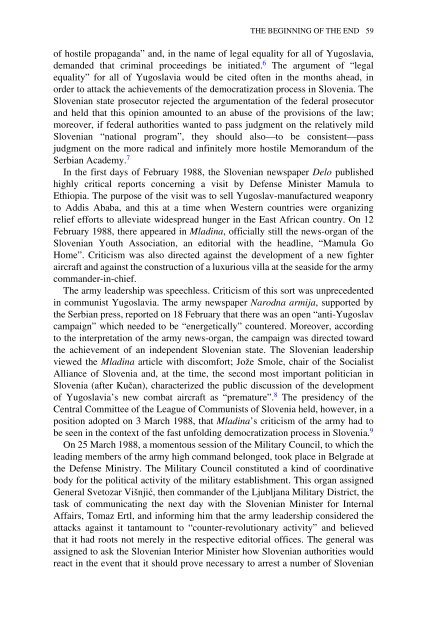Yugoslavia: A History of its Demise - Indymedia
Yugoslavia: A History of its Demise - Indymedia
Yugoslavia: A History of its Demise - Indymedia
You also want an ePaper? Increase the reach of your titles
YUMPU automatically turns print PDFs into web optimized ePapers that Google loves.
THE BEGINNING OF THE END 59<br />
<strong>of</strong> hostile propaganda” and, in the name <strong>of</strong> legal equality for all <strong>of</strong> <strong>Yugoslavia</strong>,<br />
demanded that criminal proceedings be initiated. 6 The argument <strong>of</strong> “legal<br />
equality” for all <strong>of</strong> <strong>Yugoslavia</strong> would be cited <strong>of</strong>ten in the months ahead, in<br />
order to attack the achievements <strong>of</strong> the democratization process in Slovenia. The<br />
Slovenian state prosecutor rejected the argumentation <strong>of</strong> the federal prosecutor<br />
and held that this opinion amounted to an abuse <strong>of</strong> the provisions <strong>of</strong> the law;<br />
moreover, if federal authorities wanted to pass judgment on the relatively mild<br />
Slovenian “national program”, they should also—to be consistent—pass<br />
judgment on the more radical and infinitely more hostile Memorandum <strong>of</strong> the<br />
Serbian Academy. 7<br />
In the first days <strong>of</strong> February 1988, the Slovenian newspaper Delo published<br />
highly critical reports concerning a visit by Defense Minister Mamula to<br />
Ethiopia. The purpose <strong>of</strong> the visit was to sell Yugoslav-manufactured weaponry<br />
to Addis Ababa, and this at a time when Western countries were organizing<br />
relief efforts to alleviate widespread hunger in the East African country. On 12<br />
February 1988, there appeared in Mladina, <strong>of</strong>ficially still the news-organ <strong>of</strong> the<br />
Slovenian Youth Association, an editorial with the headline, “Mamula Go<br />
Home”. Criticism was also directed against the development <strong>of</strong> a new fighter<br />
aircraft and against the construction <strong>of</strong> a luxurious villa at the seaside for the army<br />
commander-in-chief.<br />
The army leadership was speechless. Criticism <strong>of</strong> this sort was unprecedented<br />
in communist <strong>Yugoslavia</strong>. The army newspaper Narodna armija, supported by<br />
the Serbian press, reported on 18 February that there was an open “anti-Yugoslav<br />
campaign” which needed to be “energetically” countered. Moreover, according<br />
to the interpretation <strong>of</strong> the army news-organ, the campaign was directed toward<br />
the achievement <strong>of</strong> an independent Slovenian state. The Slovenian leadership<br />
viewed the Mladina article with discomfort; Jože Smole, chair <strong>of</strong> the Socialist<br />
Alliance <strong>of</strong> Slovenia and, at the time, the second most important politician in<br />
Slovenia (after Kučan), characterized the public discussion <strong>of</strong> the development<br />
<strong>of</strong> <strong>Yugoslavia</strong>’s new combat aircraft as “premature”. 8 The presidency <strong>of</strong> the<br />
Central Committee <strong>of</strong> the League <strong>of</strong> Communists <strong>of</strong> Slovenia held, however, in a<br />
position adopted on 3 March 1988, that Mladina’s criticism <strong>of</strong> the army had to<br />
be seen in the context <strong>of</strong> the fast unfolding democratization process in Slovenia. 9<br />
On 25 March 1988, a momentous session <strong>of</strong> the Military Council, to which the<br />
leading members <strong>of</strong> the army high command belonged, took place in Belgrade at<br />
the Defense Ministry. The Military Council constituted a kind <strong>of</strong> coordinative<br />
body for the political activity <strong>of</strong> the military establishment. This organ assigned<br />
General Svetozar Višnjić, then commander <strong>of</strong> the Ljubljana Military District, the<br />
task <strong>of</strong> communicating the next day with the Slovenian Minister for Internal<br />
Affairs, Tomaz Ertl, and informing him that the army leadership considered the<br />
attacks against it tantamount to “counter-revolutionary activity” and believed<br />
that it had roots not merely in the respective editorial <strong>of</strong>fices. The general was<br />
assigned to ask the Slovenian Interior Minister how Slovenian authorities would<br />
react in the event that it should prove necessary to arrest a number <strong>of</strong> Slovenian
















